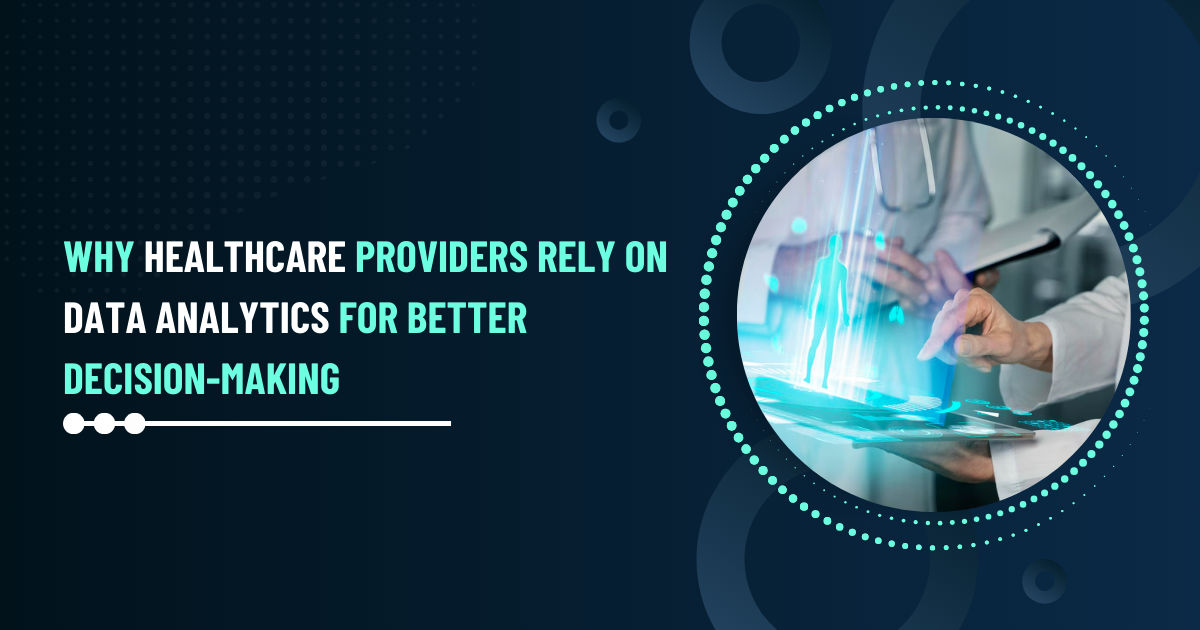Why Healthcare Providers Rely on Data Analytics for Better Decision-Making

Strong 8k brings an ultra-HD IPTV experience to your living room and your pocket.
In recent years, Healthcare Data Analytics has emerged as a vital tool for healthcare providers to improve their decision-making processes. The rise of electronic health records (EHRs), wearables, and other digital tools has generated an immense amount of healthcare data. However, the challenge lies in converting this data into actionable insights that improve patient care, operational efficiency, and overall health outcomes.
What is Healthcare Data Analytics?
Healthcare Data Analytics refers to the use of advanced tools and technologies to analyze vast amounts of data within the healthcare sector. This data can come from various sources such as patient records, lab results, medical imaging, wearables, insurance claims, and more. By analyzing these data points, healthcare providers can extract valuable insights to inform decision-making, enhance patient care, and optimize business operations.
The use of data analytics in healthcare enables professionals to predict trends, optimize treatment plans, monitor patient progress, and improve the overall healthcare experience. Healthcare Data Analytics Services are increasingly being used to convert raw data into actionable knowledge.
How Healthcare Data Analytics Enhances Decision-Making
1. Improving Patient Care through Predictive Analytics
One of the most significant ways Healthcare Data Analytics benefits decision-making is through predictive analytics. Predictive analytics use statistical algorithms and machine learning techniques to predict future health outcomes based on historical data.
For example, a healthcare provider can use data analytics to identify patients at high risk of developing chronic conditions like diabetes or heart disease. By analyzing patient data, such as lifestyle factors, genetics, and medical history, predictive models can flag patients who might need more proactive care, enabling early intervention and better management of these conditions.
Example: Mount Sinai Health System in New York uses predictive analytics to identify patients at risk of hospital readmissions. This approach has reduced readmission rates and improved patient outcomes by enabling healthcare providers to take preemptive actions such as follow-up appointments and adjustments to treatment plans.
2. Optimizing Treatment Plans with Data-Driven Insights
Healthcare providers often have to make complex decisions regarding the best course of treatment for patients. Data analytics enables providers to make evidence-based decisions by analyzing large datasets of medical histories, treatment outcomes, and patient characteristics.
For instance, data analytics can help physicians identify which treatments are most effective for patients with specific conditions, based on their unique medical profiles. This leads to better-targeted treatments, reducing trial and error, and improving patient outcomes.
Example: IBM Watson Health has been at the forefront of using AI and data analytics to help doctors make more accurate and informed decisions. Watson analyzes millions of medical records and clinical trial data to suggest personalized treatment options for cancer patients, improving treatment accuracy and patient recovery rates.
3. Enhancing Operational Efficiency and Reducing Costs
Data analytics also plays a crucial role in improving the operational efficiency of healthcare providers. Healthcare facilities often face operational challenges, such as managing resources, scheduling appointments, and optimizing staff levels. By leveraging data analytics, hospitals and clinics can streamline these processes and allocate resources more efficiently.
For instance, hospitals can use data analytics to predict patient inflow, optimize bed occupancy, and ensure that critical departments like emergency rooms are appropriately staffed. Data-driven decisions about inventory management and supply chain optimization can help healthcare providers reduce waste and avoid stock shortages, leading to significant cost savings.
Example: Cleveland Clinic uses data analytics to optimize staff schedules and reduce patient wait times. By analyzing patterns in patient appointments and hospital traffic, they have successfully reduced wait times and improved the efficiency of hospital operations.
4. Enhancing Patient Engagement and Satisfaction
Patient satisfaction is a critical factor in the healthcare industry. Data analytics helps healthcare providers engage patients better by providing them with personalized care and more transparent information. By analyzing patient feedback, satisfaction surveys, and health outcomes, providers can identify areas for improvement and create personalized care plans that cater to individual needs.
For example, through data analytics, a healthcare provider can track patient preferences, such as appointment timing, care options, and even communication channels. This allows providers to enhance the patient experience, increase engagement, and improve overall satisfaction with healthcare services.
Example: Cerner, a healthcare IT company, has integrated data analytics into its systems to track patient satisfaction. By analyzing patient feedback and treatment outcomes, they help healthcare providers refine patient engagement strategies, leading to higher satisfaction scores.
5. Ensuring Better Population Health Management
Population health management refers to the process of improving the health outcomes of a group of individuals, often through preventive measures, health education, and early interventions. Healthcare providers can use data analytics to monitor population health trends and identify high-risk groups within a population.
For example, data analytics can help track disease outbreaks, vaccination rates, and the effectiveness of health interventions. By analyzing demographic data, healthcare providers can better allocate resources to underserved areas, improve health policies, and prioritize preventative care, leading to better overall health outcomes for communities.
Example: Geisinger Health System uses data analytics to identify health trends and prevent chronic diseases in specific populations. They have implemented programs like the "Fresh Food Pharmacy" to provide healthy food to diabetic patients, significantly improving their health outcomes.
Benefits of Using Healthcare Data Analytics Services
1. Access to Specialized Expertise and Tools
One of the primary reasons healthcare providers rely on Healthcare Data Analytics is the access they gain to specialized expertise and advanced analytics tools. These services offer healthcare organizations the ability to work with skilled data scientists and analysts who have experience in healthcare-specific challenges.
These experts can implement machine learning algorithms, data mining, and artificial intelligence techniques that may otherwise be too complex or resource-intensive to manage in-house. Healthcare providers benefit from cutting-edge tools and techniques without the need for extensive in-house resources.
2. Data Integration from Multiple Sources
Modern healthcare organizations generate data from a variety of sources, including EHRs, wearable devices, patient monitoring systems, and insurance claims. One challenge is integrating these diverse data sources into a single, cohesive system. Healthcare Data Analytics Services provide solutions for seamless data integration, allowing providers to make decisions based on a complete and accurate picture of a patient's health.
3. Better Risk Management
Risk management is a major concern for healthcare providers, especially when it comes to patient safety, compliance, and financial performance. With the help of data analytics services, healthcare organizations can proactively identify potential risks and take preventive measures. For instance, predictive models can help hospitals identify high-risk patients, reducing the chances of adverse events and improving patient safety.
Conclusion
In the modern healthcare landscape, Healthcare Data Analytics has become a game-changer. By leveraging data to make more informed decisions, healthcare providers can significantly improve patient care, enhance operational efficiency, reduce costs, and optimize overall health outcomes. Predictive analytics, improved treatment plans, better resource allocation, and enhanced patient engagement are just some of the benefits that healthcare providers experience by relying on data analytics.
As the healthcare industry continues to evolve, data analytics will only become more integral in shaping the future of healthcare. With the help of Healthcare Data Analytics Services, providers can stay ahead of the curve and make smarter, more effective decisions that lead to better outcomes for both patients and organizations alike.
By embracing the power of data analytics, healthcare providers can ensure that they are delivering the best possible care while also optimizing their operations and resources. In an era where data is a valuable asset, it’s clear that healthcare providers who leverage these technologies will be the ones to thrive in the future.
Note: IndiBlogHub features both user-submitted and editorial content. We do not verify third-party contributions. Read our Disclaimer and Privacy Policyfor details.







